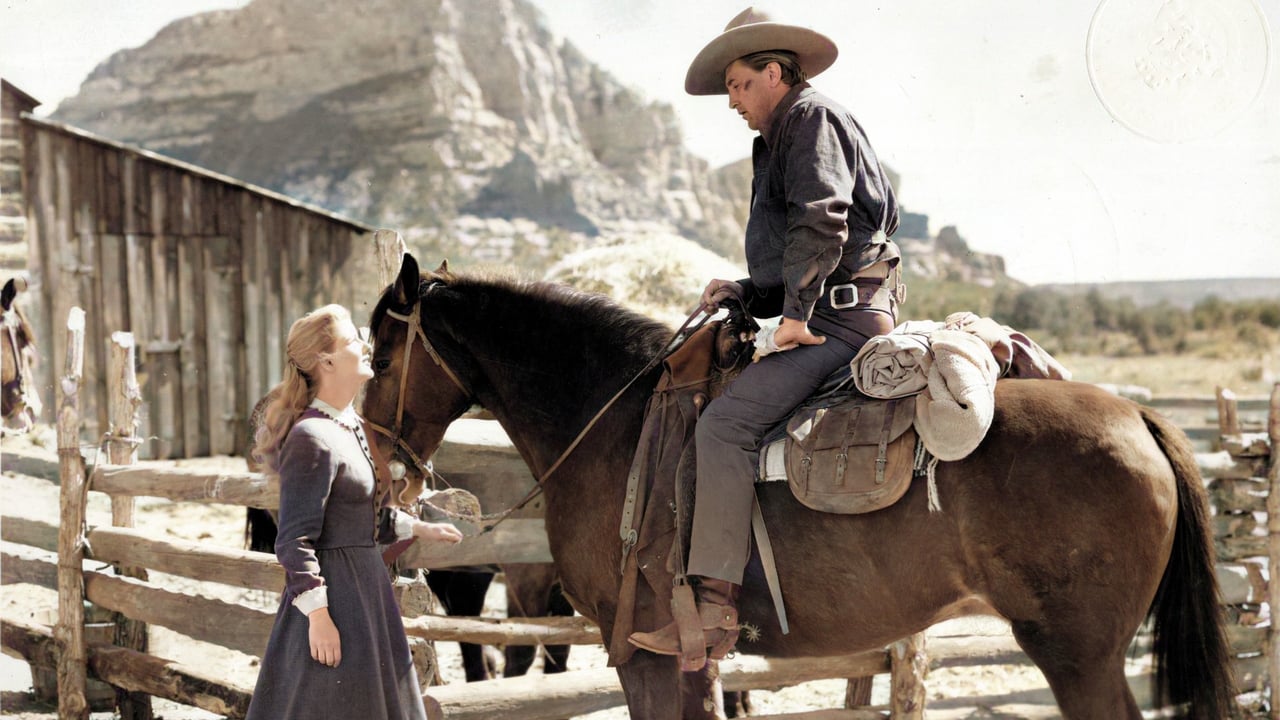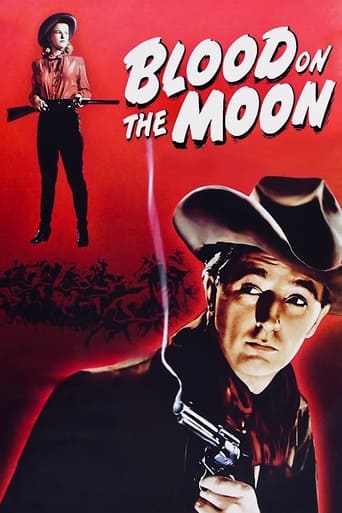

Whoever came up with the line in my summary above ought to get a prize. It was spoken by Robert Mitchum's character Jim Garry right before he went mano a mano with bad guy Riling (Robert Preston) at the Commissary saloon. It was a see-saw battle for a time and might have been curtains for Garry but for the intervention of old Kris Barden (Walter Brennan), who by that time had had his fill of Riling's underhanded dealings with his fellow ranchers.Well ordinarily you wouldn't get such a fine story coming out of a late Forties Western. The plot contains an element I haven't seen before, whereby baddie Riling enlists the aid of government Indian agent Pindelast (Frank Faylen) to seize the cattle herd of rancher Lufton (Tom Tully) if he's still grazing on reservation land by a certain deadline. Lufton plants a false message with his daughter Amy (Barbara Bel Geddes) on where he'll transfer his herd, as Jim Garry is caught up in the intrigue while straddling both factions until he gets the lay of the land.If your only memory of actress Bel Geddes is from her role as matriarch of the Ewing Family on the hit TV series 'Dallas', you'll probably be surprised to see what a good looking woman she was in her early years here. The same can be said of other actresses like Angela Lansbury and Bette Davis, so being an avid film fan has it's unexpected surprises and rewards. Her character Amy Lufton gets off on the wrong foot with Garry, but winds up heading off into the proverbial sunset with him by film's end.But on the way there, the dusty trail is replete with villainous plots and double cross, and in a way, one could argue that Jim Garry pulled off his fair share as well. But only after seeing how Riling was using his position to deceive his fellow ranchers and try to corrupt one of the Lufton daughters to set up her Dad. Speaking of which, how did Garry know that Riling was seeing Carol Lufton (Phyllis Thaxter) on the sly? There wasn't even a hint in the story line of how he could have learned that.Other reviewers here comment on the noir-like nature of this picture and I guess I'd have to concur. There's that scene of Mitchum coming out of the shadows right after his fight with Riling that could serve as a poster shot for the genre if this wasn't actually a Western. Other elements serve as well, particularly the dark atmosphere and the presence of Carol Lufton before she has her reality check with Riling. And you can't get any more noir than having a title like "Blood on the Moon".
... View MoreBlood on the Moon is directed by Robert Wise and is adapted from a Luke Short story by Lillie Hayward and Harold Shumante. It stars Robert Mitchum, Barbara Bel Geddes, Robert Preston, Walter Brennan, Phyllis Thaxter, Frank Faylen, Tom Tully and Charles McGraw. Music is by Roy Webb and cinematography by Nicholas Musuraca. Story has Mitchum as drifting cowboy Jim Garry, who after receiving a job offer in the mail from old acquaintance Tate Riling (Preston), finds himself pitched in the middle of a war between cattle ranchers and homesteaders.Effective and tightly crafted Western that has garnered many favourable remarks, due in the main to its ability to veer away from formula suggested by the plot and the technical film noir touches brought about by the great Musuraca. With Mitchum turning in one of his great screen dominating performances, film is driven forward by the psychological aspects brought about by thematics such as duplicity, split loyalties and moral quandaries. Director Wise does a good job of pacing the film, keeping it on the slow burn whilst dialling into Jim Garry's mindset, and picture is further boosted by a great knuckle fight and a rip-roaring siege shoot out at the end. But it's the mood created by Musuraca and Wise that is the real winner. With the film set 90% at night or in darkened rooms, shadow play is high and an oppressive feel adds weight to the psychological clocks ticking away in the narrative. In support of Mitchum, Geddes does spunky cowgirl well, while the presence of Brennan, Faylen and the gravel voiced McGraw is keenly felt.Good story, well acted and visually potent. 7/10
... View MoreYou can see the film noir lurking behind the western in this western noir in the first plot twist. Behind the facade of a typical western conflict between cattle owners and homesteaders lies a distinctly noirish crime setup, "the big con", and yet it's exactly that kind of inconistency that prevents BLOOD ON THE MOON from reaching the greatness parts of it faintly suggest. Because the conflict foreshadowed in the first act between cattle baron (usually the bad guy in a western) and the conniving leader of the homesteaders is abandoned in the third act so Robert Mitchum's drifter character can hole up in Walter Brennan's shack and exchange shots with the hired guns of his former employer. Because the perenial world-weariness of Mitchum's droopy face is undercut by a Hollywood ending where everything is tied up neatly with a ribbon on top. We're still in good guys/bad guys territory and director Robert Wise opens his cards about who's what way too early, so that the rest of the film and the promise of the good first 30 minutes is squandered in people running hither and thither, to do this or that or prevent those from happening. Gorgeously photographed and watchable throughout, but more of a missed chance than the bonafide western noir classic it should have been.
... View MoreClass A western with a great Robert Mitchum performance. Unlike other tall men riding in the films of that time, Mitchum's character is not a snow white hero coming to save the day,but a darkened figure just two steps from being an outlaw. Robert Preston is the charming,jovial wolf in a manner similar to Arthur Kennedy in Bend In the River and Robert Ryan's performance in The Naked Spur. Their epic brawl in an out of the way dingy saloon is one of the best movie fights ranking with John Wayne's and Randolph Scott's The Spoilers duel. Proves that RKO was for a time home to some true innovations in movie story telling. Mitchum's character will only go so far and thanks to Barbara Bel Geddes non Cathy turn as a frontier woman who gradually replaces her Calamity Jane-ish dress to become, seemingly, more domesticated in the manners of both typical western heroines and the mainstream movie going publics view of women after WWII ( Rosie the Riveter transforming into June Cleaver). The fact is though she isn't a screamer nor a corner huddler but equally as strong as Moody Bob. Great Western.
... View More